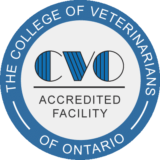UGVS Newsletter – March 2022
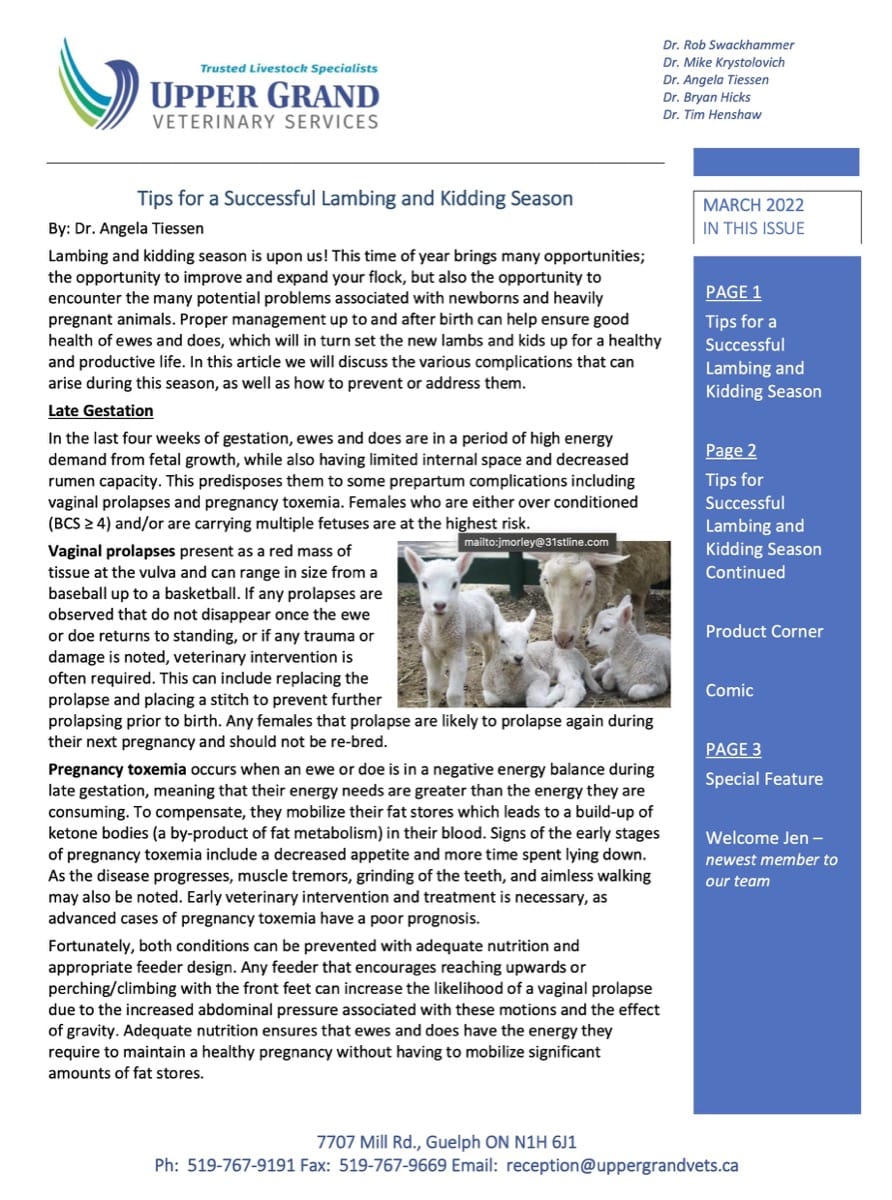
Tips for a Successful Lambing and Kidding Season
Lambing and kidding season is upon us! This time of year brings many opportunities; the opportunity to improve and expand your flock, but also the opportunity to encounter the many potential problems associated with newborns and heavily pregnant animals. Proper management up to and after birth can help ensure good health of ewes and does, which will in turn set the new lambs and kids up for a healthy and productive life. In this article we will discuss the various complications that can arise during this season, as well as how to prevent or address them.
Late Gestation
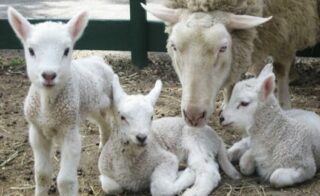 In the last four weeks of gestation, ewes and does are in a period of high energy demand from fetal growth, while also having limited internal space and decreased rumen capacity. This predisposes them to some prepartum complications including vaginal prolapses and pregnancy toxemia. Females who are either over conditioned (BCS ≥ 4) and/or are carrying multiple fetuses are at the highest risk.
In the last four weeks of gestation, ewes and does are in a period of high energy demand from fetal growth, while also having limited internal space and decreased rumen capacity. This predisposes them to some prepartum complications including vaginal prolapses and pregnancy toxemia. Females who are either over conditioned (BCS ≥ 4) and/or are carrying multiple fetuses are at the highest risk.
Vaginal prolapses present as a red mass of tissue at the vulva and can range in size from a baseball up to a basketball. If any prolapses are observed that do not disappear once the ewe or doe returns to standing, or if any trauma or damage is noted, veterinary intervention is often required. This can include replacing the prolapse and placing a stitch to prevent further prolapsing prior to birth. Any females that prolapse are likely to prolapse again during their next pregnancy and should not be re-bred.
Pregnancy toxemia occurs when an ewe or doe is in a negative energy balance during late gestation, meaning that their energy needs are greater than the energy they are consuming. To compensate, they mobilize their fat stores which leads to a build-up of ketone bodies (a by-product of fat metabolism) in their blood. Signs of the early stages of pregnancy toxemia include a decreased appetite and more time spent lying down. As the disease progresses, muscle tremors, grinding of the teeth, and aimless walking may also be noted. Early veterinary intervention and treatment is necessary, as advanced cases of pregnancy toxemia have a poor prognosis.
Fortunately, both conditions can be prevented with adequate nutrition and appropriate feeder design. Any feeder that encourages reaching upwards or perching/climbing with the front feet can increase the likelihood of a vaginal prolapse due to the increased abdominal pressure associated with these motions and the effect of gravity. Adequate nutrition ensures that ewes and does have the energy they require to maintain a healthy pregnancy without having to mobilize significant amounts of fat stores.
The last 4 weeks of gestation are also important for udder development and colostrum production. To ensure the production of good quality colostrum, vaccination for clostridial diseases is recommended a few weeks before lambing or kidding is due to commence. If the females have not been vaccinated within the last year, they will also require an initial vaccine 4-6 weeks prior.
Birth and neonatal care
Ewes and does should be checked regularly when they are approaching their due date and while they are giving birth to determine whether intervention is required. Signs that an ewe or doe may need help include lack of regular progress, abnormal presentation (i.e., one leg, two legs with no head, head with no legs, etc.), or any yellow colour noted as this indicates fetal stress. If any of these signs are noted, a vaginal exam and/or a call to the vet is warranted to ensure the best chance of survival.
Neonatal Care
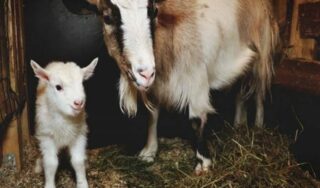 Once born, lambs and kids are susceptible to chilling, infection from pathogens in the environment, and hypoglycemia (starvation). To reduce these risks, ensure that your lambing/kidding areas are clean, dry, and draft-free. After birth, the newborns should receive an appropriate navel dip (i.e., tincture of iodine), and the mother and newborns should then be moved to a claiming pen. Claiming pens allow close monitoring to ensure timely drying off/cleaning of the newborns, consumption of colostrum, and maternal bonding. Once bonding has occurred, lambs and kids should receive a vitamin E/selenium injection for prevention of white muscle disease and can have bands applied for castration and tail docking.
Once born, lambs and kids are susceptible to chilling, infection from pathogens in the environment, and hypoglycemia (starvation). To reduce these risks, ensure that your lambing/kidding areas are clean, dry, and draft-free. After birth, the newborns should receive an appropriate navel dip (i.e., tincture of iodine), and the mother and newborns should then be moved to a claiming pen. Claiming pens allow close monitoring to ensure timely drying off/cleaning of the newborns, consumption of colostrum, and maternal bonding. Once bonding has occurred, lambs and kids should receive a vitamin E/selenium injection for prevention of white muscle disease and can have bands applied for castration and tail docking.
If you have any questions or concerns, please feel free to call the office at 519-767-9191 to speak with a vet and determine the best course of action. We are always happy to discuss any individual cases or flock level questions you may have!
Product Corner!
Product Backorder
We understand the frustration with needing a product and it is not available.
We appreciate the support and are trying to ensure we get you the product you want or a substitute as soon as we can. If possible, try to look ahead at what you may need so we can try to get it to you prior to running out. Getting product orders in early also allows us to try to accommodate product delivery.
Join us as we congratulate Dr. Mike on his Award of Associate of the Year
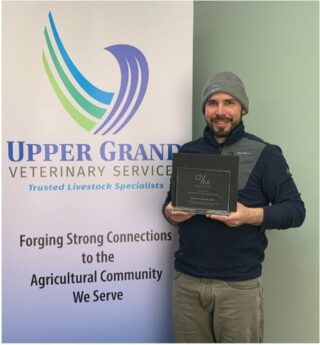 The OVMA Associate of the Year Award recognizes an associate veterinarian who has demonstrated superior customer service and has proven to be an asset to their practice, as well as their community.
The OVMA Associate of the Year Award recognizes an associate veterinarian who has demonstrated superior customer service and has proven to be an asset to their practice, as well as their community.
Following graduation from the Ontario Veterinary College in 2014, Dr. Michael Krystolovich honed his skills at two clinics before joining Upper Grand Veterinary Services in Guelph, Ont., in 2017, where his main areas of interest are dairy herd problem solving, nutrition and surgery.
Colleagues say that Dr. Krystolovich routinely and successfully tackles whatever problem is put in front of him and has solved many complicated herd-level problems for clients through his determination and compassion. In fact, his commitment to being the best veterinarian he can be is evident in everything he does.
“Whether it is reception, technician, student or veterinarian, Mike patiently mentors them equally with kindness and skill,” says Dr. Rob Swackhammer, practice owner at Upper Grand Veterinary Services. “His kind guidance is invaluable to this clinic. He has been described by our practice manager as the glue that holds this clinic together. I could not agree more.”
Dr. Krystolovich is also an OMAFRA-appointed food safety veterinarian and regularly holds presentations for local farm producers in his community.
“He is knowledgeable, always on time, patient, and truly cares about his work as he constantly rises above and beyond our expectations,” says one of his clients, who operates a dairy farm. “Following every visit on farm, he never fails to ask if there is anything else he can help with or do for us. One of the things that sets Dr. Mike apart is his care and dedication for people, not just for the livestock.”
Meet Our Newest Team Member – Welcome Jen!
 Jen moved to Guelph in 2007 to attend the University of Guelph where she completed her Bachelor of Arts degree in Sociology.
Jen moved to Guelph in 2007 to attend the University of Guelph where she completed her Bachelor of Arts degree in Sociology.
Over the years, she has worked in numerous industries where she has strengthened her customer service and office administration skills to make her easily adaptable to this new, and unique, experience working for Upper Grand Veterinary Services. Jen will be working Front Reception at the Guelph office over the next year and is looking forward to meeting our clients!



